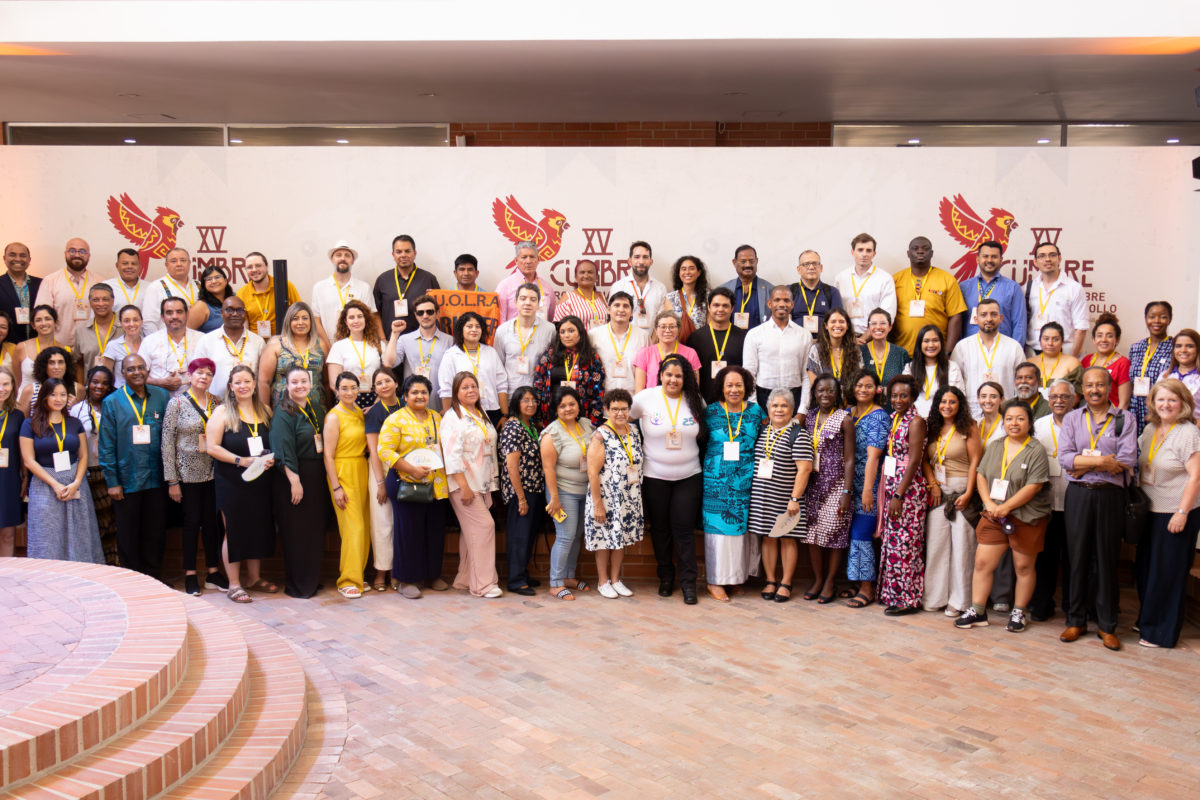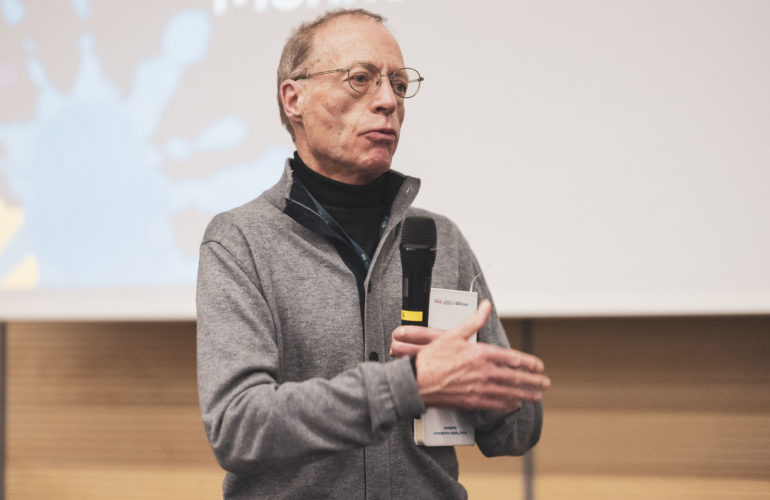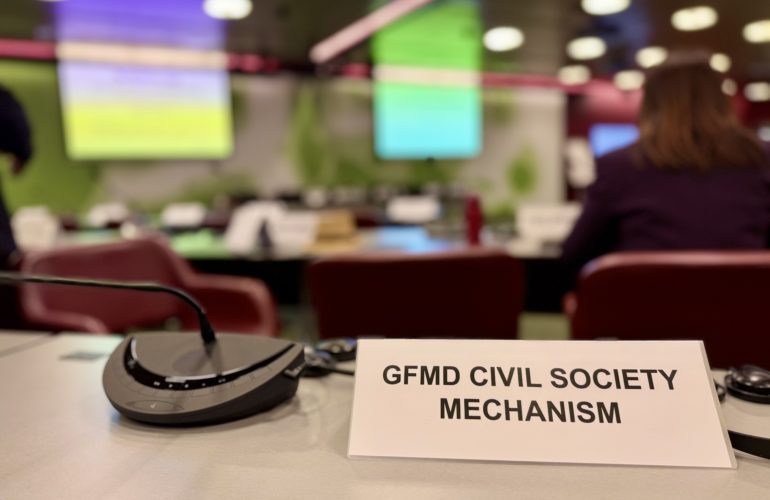ICMC Coordinates Civil Society Participation at the 15th GFMD Summit in Colombia
The GFMD Civil Society Mechanism ensured civil society voices and perspectives were present throughout the 15th Summit of the Global Forum on Migration and Development, held on 2-4 September in Riohacha, Colombia

The 15th Summit of the Global Forum on Migration and Development (GFMD)* process, under the Colombian Chairship, took place in the city of Riohacha, Colombia, on 2-4 September 2025.
In its long-standing capacity as the Civil Society Mechanism of the GFMD, ICMC facilitates the engagement of civil society organizations in the GFMD process. The 2024-25 civil society GFMD preparatory process leading up to the Summit known as ‘Sociedad Civil en Rumbo a Colombia’ (Civil Society on the Road to Colombia).
‘Resist, Reclaim, Realise’: Civil society campaign launch at the Summit
The day before the Summit, the 74 civil society delegates came together for the fourth and final Civil Society Preparatory Meeting.
In an unprecedented initiative for civil society at the GFMD, the final preparatory meeting served as the platform to launch the global civil society campaign ‘Resist, Reclaim, Realise: Migrant Rights are Human Rights’. The first campaign of its kind, it aims to take control of the migrant and human rights agenda, set the tone for civil society engagement in international governance and migration discourse, and build collective solidarity with wider social and civil society movements around the world.

Civil society delegates emphasized the critical necessity of a global campaign to meet the urgency and challenge of the current moment with respect to migrant and human rights.
“We are seeing dangerous rollbacks of migrant rights, the criminalization of migration, a crisis of state leadership, and escalating attacks on those standing in solidarity with people on the move,” said Kati Garrison of the NGO Committee on Migration. “This international race to the bottom cannot go unchallenged or be allowed to be normalized, and civil society must rise to speak with clarity, courage, and determination.”
Far from being a campaign confined solely to the GFMD Summit, ‘Resist, Reclaim, Realise: Migrant Rights are Human Rights’ is a long-term initiative, providing a foundation for civil society strategic advocacy and action in the coming years. “What is happening now is not going to change next year, or in two years, or if there is a new President of the United States,” stated William Gois of Migrant Forum in Asia. “This is why the campaign will be in place to guide and sustain our actions in the coming 5-10 years.”
The forthcoming Civil Society Riohacha Declaration will provide a central tool for civil society to disseminate the campaign and mobilize the support and engagement of wider civil society and human rights-based social movements around the world.
“The Declaration is something that everyone can take away, and that makes clear that for civil society this is not business as usual,” explained Civil Society Mechanism Coordinator Elana Wong. “It will enable us to carry this momentum forward, to go back to our communities and carry on the fight.”
Opening the Summit: Civil society at the plenary
Responsibility for representing civil society at the GFMD Summit’s opening plenary fell to Nidia Tarazona, of the General Confederation of Labor (Confederación General del Trabajo) in Colombia. Her address was drafted as a collaborative effort with delegation leaders representing global civil society. Her address was drafted as a collaborative effort with delegation leaders representing global civil society.
Tarazona opened with a powerful rendition of the ‘Resist, Reclaim, Realise’ civil society campaign slogan, detailing the alarming extent of the criminalization of migration, exclusion of migrants, and violations of international law ongoing around the world. She focused, in particular, on the erosion of the international human rights frameworks, and highlighted the critical issue of the involvement of migrants and their civil society representatives in international spaces and dialogues on migration and development.
Concluding her plenary remarks with a call to work toward a better future, Tarazona urged all present to be courageous. “What is happening to migrants and their families, and the rollback of human rights around the world, cannot be normalized,” she stated. “We must resist these violations of international obligations. We must reclaim what we have lost. We must recognize that the rights of migrants are human rights, and that human rights are non-negotiable.”
Civil society at the GFMD Summit: Thematic Roundtables
Per the normal GFMD process, the Colombian Chairship identified six thematic priorities to be taken forward via the GFMD Roundtable process:
- RT1: Strength in Movement: The Impact of Women on Global Migration and Development
- RT2: Children and Youth on the Move: Innovators for Tomorrow’s Development
- RT3: The Interplay of Media and Culture to Construct and Deconstruct the Reality of Migration
- RT4: Climate Change: Safe Labor Routes as a Bridge to Prosperity
- RT5: Regional Cooperation and Integration to Promote Safe and Regular Migration for Development
- RT6: New Technologies and Digitalization: Improving Migration Management and Regular Migration Pathways

A three-stage Roundtable process saw a first consultation on challenges and opportunities (6-7 November 2024), and a second on promising practices and conditions for replicability (19-20 February 2025), both held in Geneva. The final Roundtable consultation took place at the 15th GFMD Summit in Riohacha, on 2-4 September 2025, and focused on exploring solutions.
Civil society had a formal role in the GFMD Roundtable process, via the Civil Society Mechanism’s co-chairing of Roundtable 5 (Regional Cooperation and Integration to Promote Safe and Regular Migration for Development), alongside the governments of Egypt and the United Arab Emirates.
“Beginning with the French Chairship of the 14th GFMD, each Mechanism has been given the opportunity to co-chair one of the thematic Roundtables,” explains Elana Wong. “We decided based on where we’d have the most impact, and nominated ourselves to co-chair RT5. We had three key aims: to ensure the role and perspectives of civil society are seen as integral to intergovernmental and cross-regional discussions and agreements, provide crucial comparative views for governments, and throw our support behind the principles of cooperation and integration across borders and migration routes that centers multistakeholder participation at all levels.”
RT5 discussions highlighted the need to ensure the involvement of a diverse range of stakeholders, at all levels of governance, in capacity building, awareness, feedback and alignment of policies, practices, and legislation in new cooperation agreements. “Regional cooperation and integration mechanisms and dialogues are at their strongest when regular open dialogue supports prioritizing key issues, moving quickly towards solutions, and responding with agility to new challenges,” Elana explains. “There was also a broad agreement on the need to harness the potential of regional cooperation not solely at the national government level, by leveraging regional and cross-border networks of stakeholders such as civil society, to push for progress, and have one another’s trust.”
***
* The GFMD is a state-led, informal, and non-binding process that helps shape the global debate on migration and development and allows governments – in partnership with civil society, the private sector, local and regional governments, youth and other relevant stakeholders – to analyze and discuss sensitive issues, create consensus, pose innovative solutions, and share policy and practices.
Find out more about the GFMD Civil Society Mechanism and the 2024-25 GFMD.

Rachel Westerby
Independent writer and researcher on migration and refugees.



